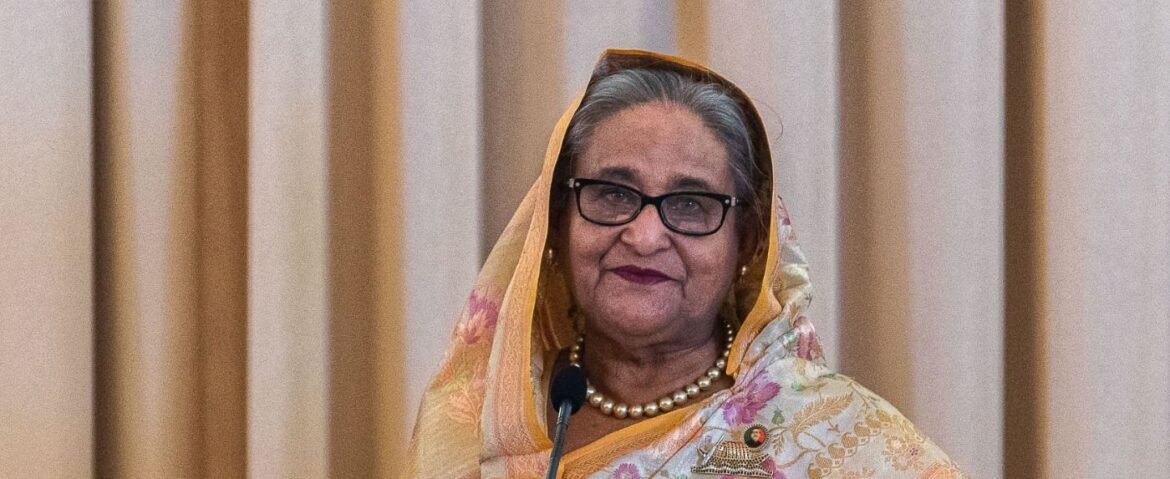Table of Contents
ToggleHasina Sentenced to Death in Landmark Bangladesh Tribunal
A landmark decision made by the International Crimes Tribunal Bangladesh has seen Sheikh Hasina, the removed Bangladesh Prime Minister, sentenced to death.
The decision is based on her reported command authority throughout the violent crackdown of protests in Bangladesh in 2024, where the police used excessive violence, carried out extrajudicial murders, and deployed drones and helicopters on protesters. Read the news on newstodate.co.uk.
This ruling also covers political revenge and alleged corruption during the reign of Hasina. The case has far-reaching consequences on accountability, transitional justice, and regional diplomacy and especially considering that she is now in exile in India.
Student-led movements and families of Bangladesh victims have shown reserved optimism over the verdict that it could offer indemnification to the survivors of the protest and some form of closure following years of tumult.
The explanation of Sheikh Hasina’s Verdict
What led to the trial?
The trial of Sheikh Hasina was a result of an amalgamation between the 2024 Bangladesh protests crackdown and the old claims of corruption and repression that had been in place under Hasina.
Zohran Mamdani to Trump: ‘Turn the Volume Up’ — Inside His Victory Speech
Rampant violence, especially among student protests, raised questions about the issue of command accountability of security centers and extrajudicial murders in cities.
International Crimes Tribunal Bangladesh Role
The trials were under the International Crimes Tribunal Bangladesh, under which crimes against humanity, like mass killings, human rights violations, and crimes against the Sheikh Hasina, were registered. The tribunal shed light on the Bangladesh mass killing tribunal model and accountability of top governance officials in case of failures in governance.
Key Factors in the Case
Student-Led Revolt and Security Action
Students and other demonstrators held massive protests that forced the government to implement political changes. Drones and helicopters were reportedly used by security forces to kill and injure people. The tribunal used the command responsibility and loopholes in the trial oversight in the interim government in Bangladesh.
Accident in India and Diplomatic Hurdles
The sentence is compromised by the fact that Sheikh Hasina is in exile in India. The international law and diplomatic negotiations have taken centre stage in deciding whether or how the conviction will be carried out.
Payments and Justice of Transition
The tribunal placed great stress on the compensation of the survivors of the protest and the creation of mechanisms to avoid political vengeance in subsequent governance systems. The human rights activists have demanded that the verdict should be enforced transparency and in a consistent manner.
Wider Implications
Political and Social Impression
The death penalty judgment passed by the Bangladesh PM Hasina, is an indication of the change in political responsibility. It also poses an issue on the stability of the region, reform of governance, and the way to handle future protests.
Lessons on Security and Governance
Extrajudicial killings in Bangladesh revealed the need to reform the security forces and observe human rights principles. The decision can be used as a guideline in the allocation of command in other cases in the future.
International Perception
The criminal guilt of crimes against humanity, which entails the conviction of Sheikh Hasina, places Bangladesh on the world map in terms of justice and accountability. The international actors are monitoring the effects of the case on diplomacy, transitional authority, and the enforcement of the rule of law.
Conclusion
When Sheikh Hasina was sentenced, it was one of the events in the legal and political history of Bangladesh. The conviction highlights responsibility over the alleged offences committed during the 2024 Bangladesh protests crackdown, such as extrajudicial murders and corruption under the rule of Hasina.
The tribunal establishes a precedent with regard to governance reform and transitional justice by laying stress on command responsibility of security forces. Although the obstacles are not eliminated yet, such as her deportation to India and the logistics of enforcement, the case offers hope of compensation to the protest survivors and political integrity in the future.
To a great extent, this decision is a victory in combating the violation of human rights, providing a system of accountability in governance, and proving that no ruler is above the law. The assessment of the international community and local collaboration will be required to make the verdict effective and legitimate in the long run.
FAQs
What was the crime that Sheikh Hasina was found guilty of?
The offenses against humanity, to which she was convicted, were extrajudicial killings and corruption in the 2024 protests crackdown.
Who oversaw the trial?
The legal proceedings were conducted by the International Crimes Tribunal Bangladesh.
How does India play in this?
Sheikh Hasina is in exile in India, and this makes it difficult to enforce the death sentence.
Will the survivors of the protest be compensated?
The tribunal emphasized compensation as one of the priorities of the 2024 protest victims.
What does this decision mean to the politics of Bangladesh?
It can and will affect governance reform, security procedures, and future political accountability procedures.


